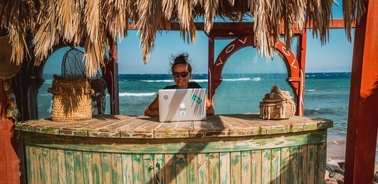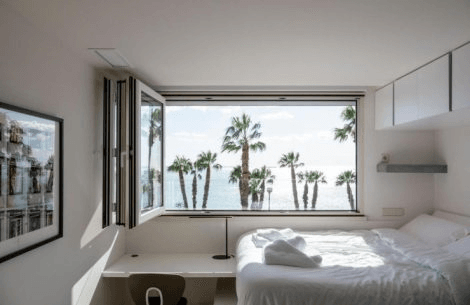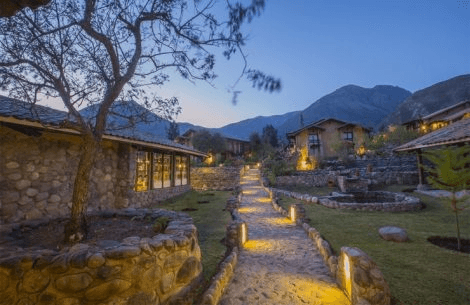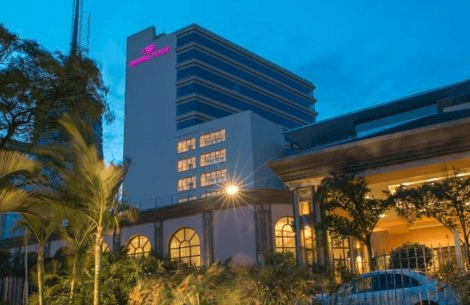- Home
- News And Events
- What’s Going On
- Ie Business School Alumni Revamping Tourism Sector
IE Business School Alumni Revamping Tourism Sector

Following the worldwide pandemic, these hospitality businesses are still standing.
As the world wakes slowly from the dormant state of isolation, shaking off the layers of restrictions and people set their lives in motion, one of the most impacted sectors begins to flourish again: tourism.
Vaccination rollouts, increased airline routes and discounted hotel packages are all factors in plans to revive the multi-billion dollar industry. There is still a long way to go, though, to get back to pre-pandemic heights.
According to the World Tourism Organization, international tourist arrivals-- a good barometer for the sector-- dropped by 85% in January-May 2021 compared to the same period of pre-pandemic year 2019, or 65% over 2020.
But the entrepreneurial mindset of IE Business School sees opportunity where others see obstacles. From capitalizing on remote workers and quarantine requirements to restructuring companies and adding properties, some IE students and alumni have revamped their hospitality businesses to survive the pandemic.
See how they did it and what’s next for these tourism-related IE alumni businesses:
Jose Angel Prado Pena
José Angel Prado, Managing Director at Prafamar, said when the pandemic hit, it was clear they had to adopt a customer-centric approach at the company’s two hotels in the Canary Islands, Hotels Playa del Sol in Gran Canaria and Surfing Colors Hotel in Fuerteventura. Prado said he listened to what customers needed and analyzed all available information.
At first, that meant that as other hotels began closing their doors, the group’s Canary properties offered refuge to tourists who were not able to go back home.
According to the IE business master alum, when hotels reopened in August 2020, he noticed customers wanted to extend their stay at hotels with the apartment-hotel accommodation that Prafamar offered. This decision allowed them to focus on the new niche market of domestic workers from the mainland who were forced to work online and didn’t need to leave the islands.
As the world acclimated to remote working, the hotels’ clients found they weren’t in a hurry to rush back home– as long as they had high-speed Internet service.
This insight allowed the company to benefit from digital nomads and other short-term residents during times when competitors were mostly closed. During the height of the pandemic last winter, the hotels registered 84% and 53% occupancy.
The company also forged a collaboration with Iberia Express and a partnership with advertising agencies h2o71 and Viae, with advertising campaigns of both hotels in the Madrid and Barcelona subways and billboards, offering the ability to work from the Canary Islands.
Today, Playa del Sol Hotel has an occupancy of 90% and Surfing Colors of 81%, with mostly domestic customers as well as some international clients. Now, the guests have access to newly inaugurated coworking areas and other co-living zones with communal kitchens to make the stay more hospitable.
“Clients were looking for a place of refuge from Covid where the first step they took once they closed their computers, was to dive in a pool or in the Atlantic Ocean, or to grab a bike or board and practice their favorite sport.”
JOSE ANGEL PRADO PENA
Carlos Pérez-Lanzac De Lorca
 Casa Pirulo. Málaga, Spain.
Casa Pirulo. Málaga, Spain.In 2010, as the digitization of the world was becoming increasingly more prominent, and new technologies disrupted businesses of all sectors, Carlos Pérez-Lanzac decided to complement his education with IE Business School’s International MBA. That’s when he noticed the changes in the tourism and hospitality sector with emerging models of sharing-economy and digital platforms of commercialization.
Pérez-Lanzac set up Caleta Homes, a residential tourism platform that works with property owners in Spain and provides support in portfolio advice, positioning and commercialization of their properties through a platform that connects them with the right clients.
Then, Pérez-Lanzac founded Vitur Summit, a European networking forum for holiday rentals. The IMBA graduate has invested himself in lobbying the public sector as Founding President of the Vacation Rentals Association of Andalusia, board of directors of the Spanish Federation of Vacation Rentals (FEVITUR) and a member of the association of entrepreneurs in the South of Spain (CESUR) among others. He is also a member of the Managing Committee at the European Holiday Home Association (EHHA).
The Covid-19 pandemic challenged Pérez-Lanzac to tackle additional issues, addressing restrictions at an advocacy level. Informed by his own experience in Caleta Homes and Vitur, coupled with his networking with others in the industry, Pérez-Lanzac could see the upcoming trends– before legislators and regulators.
“When it comes to lobbying both locally and in Europe, it’s always hard because the normatives are always behind when it comes to disruptive models and innovations in the industry,” he said.
According to the IMBA alum, the social and behavioral changes caused by the pandemic are “game-changers,” with demand for residential tourism accommodation rising 40%.
“This is going to radically change everything. Trends such as telecommuting where people will not depend on the location of their work to be where they want to be, will disrupt and change the real estate market,” said Pérez-Lanzac.
“Many changes are coming and I think it’s fascinating.”
CARLOS PÉREZ-LANZAC DE LORCA
Rodrigo Lazarte Molina
 Valle Sagrado Urubamba Hotel. Cusco, Perú
Valle Sagrado Urubamba Hotel. Cusco, PerúRodrigo Lazarte defines himself as a born traveler. Lazarte graduated from IE’s Master in Management in 2009 and one year later founded Tierra Viva Hotels, a Peruvian hospitality company with 12 hotels scattered throughout the South American country.
Lazarte said rather than a hotel chain, Tierra Viva is a concept created by travelers for travelers that “contributes towards making travel an unforgettable experience.”
“Our corporate culture is very strong and it is what makes our team unique and able to provide a distinct kind of service,” said Lazarte.
During the global pandemic Tierra Viva was severely affected. Lazarte and the Tierra Viva team decided to restructure the company internally to reduce costs and refinance liabilities. Most importantly, the goal was to respond to customers’ needs during the pandemic.
The hotels quickly adapted to the situation by creating Viva Home, where they adapted rooms for quarantining purposes and long stay users. They also implemented the Viva Office, turning rooms into office spaces apt for conferences, meetings and daily work.
Lazarte said Tierra Viva Hotels has diversified their target by including corporate clients in addition to those via Online Travel Agencies.
He said he is confident the company will get back on track.
“It’ll take the next two years for recovery and then we can continue with our international expansion plans–Colombia, Chile, Bolivia, Ecuador and Mexico.”
RODRIGO LAZARTE MOLINA
Ali Akbarali
 Crowne Plaza Hotel. Nairobi, Kenya
Crowne Plaza Hotel. Nairobi, KenyaIE Brown Executive MBA student Ali Akbarali grew up living in hotels so it was a natural step for him to run the family business Maplestar Hotels Group. As Managing Director, he oversees the development and operations of the group’s properties in Canada and Sub-Saharan Africa and manages client relations for commercial properties and residential developments in Kenya.
During 2020, Akbarali shut down hotels and laid off staff, an experience which he describes as heart breaking.
He decided to use the pause to rethink the business without the constraints of maintaining a status quo.
“We have used the downtime to improve our past inefficiencies, re-built our business processes and operations stronger, and instituted new best practices to give us an edge as we slowly come out of the pandemic,” said Akbarali.
In part, that has meant diversifying as a real estate developer. The current IE student said he’s eyeing new real estate projects, an area of work he personally enjoys.
“Finding an excellent greenfield property, putting the professional team together, sitting with the architect and engineers, and watching a 2-D design come to life is a fun part of the business.”